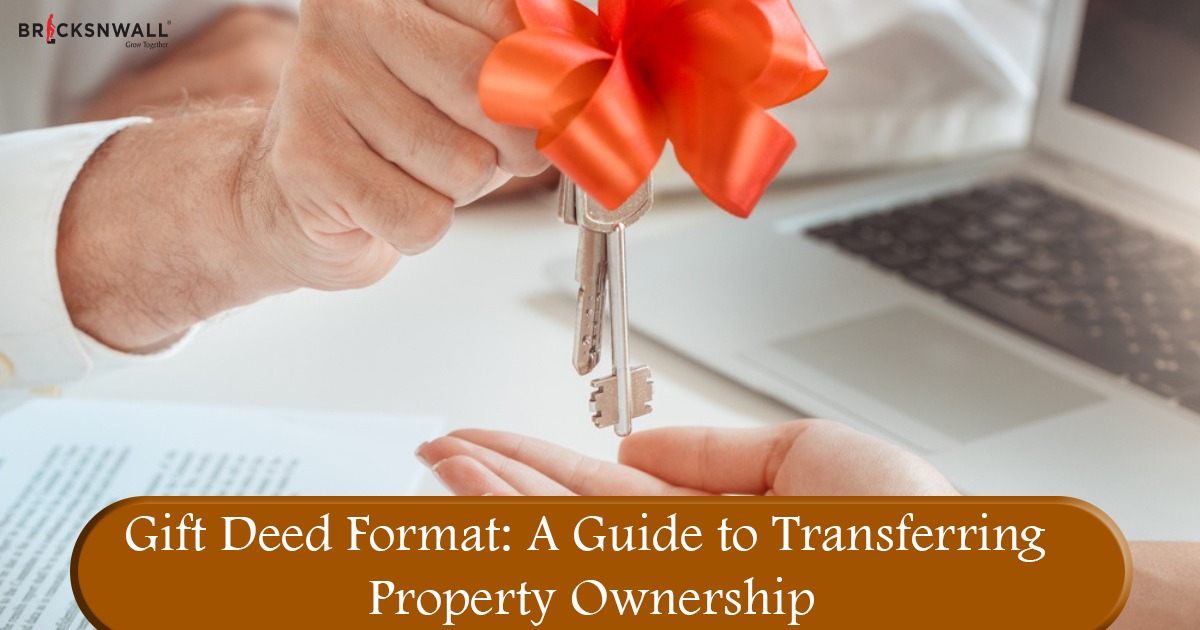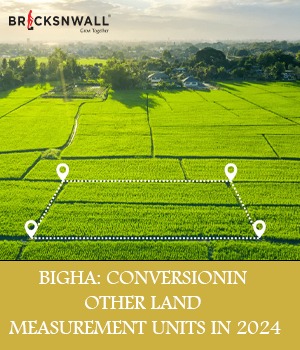Gift Deed Format: A Guide to Transferring Property Ownership
Bricksnwall Trusted Experts

In India, the Transfer of Property Act of 1882 ("Act") governs property transfers as gifts. A gift of property is the transfer of ownership of one's property to another person by the execution of a gift deed. The gift deed is an instrument by which an immovable or mobile property owner transfers his or her property to another person without consideration as a gift.
The person who gives away his or her property is referred to as the donor, and the one who accepts the gift is known as the donee. The donor must freely give the property to the donee without contemplating whether the gift is legitimate under the Act. For the gift to be legally valid, the donee must accept it while the donor is still alive.
The donation of immovable property becomes effective after the gift deed is recorded with the appropriate Registrar or Sub-Registrar. The gift of movable property becomes effective when the gift deed is registered or the property is delivered. When the gift deed is recorded, the property transfers from the donor to the donee instantly, and the parties do not need to go to court to have it executed.
When a donor desires to transfer immovable property to a donee, the gift deed must be registered. A gift deed must be executed out of love and care for the donee, with no expectation of return.
Properties that can be gifted via a gift deed
Donors can donate both immovable and mobile
properties as gifts to donees. Immovable property refers to land or any
benefits derived from land or anything attached to the earth, but it excludes
growing crops, standing timber, and grass. Properties that are not classified
as immovable are considered moveable.
However, the donor can only gift properties that exist at the moment the gift deed is registered. He cannot give away property that he expects to receive in the future. The donor may only give away property over which he or she has legal ownership. The donor must own the property at the time of the gift.
Clauses for a Gift Deed
Details of Donor and Donee - The gift deed should
include the donor's name, address, and relationship to the donee.
compensation - The gift deed should state that the
donor is conveying the gift property out of love and regard for the donee, with
no other compensation involved.
Voluntary Transfer - The gift deed should state
that the donor is voluntarily transferring ownership of the gift property to
the donee. The transfer must be free of fear, coercion, or threats.
Ownership of Property - The gift deed should state that the property exists, that the donor is the sole owner of the gift property, and that the donor has given the donee possession of the gift property.
Property Details - The gift deed should contain a
full description of the donation property.
The donee's rights should be mentioned in the gift
deed. It comprises the donee's rights to peaceful enjoyment of the property as
well as the ability to sell, mortgage, or lease it.
Acceptance by Donee - The gift deed should state
that the donee accepts the gift of property.
Delivery - The gift deed should indicate or imply
the intention to deliver possession of the gift property.
Witnesses - The donation deed should include the
witnesses' names and addresses. It must be signed and attested by at least two
witnesses.
Revocation - The gift deed does not require a
revocation clause of the gift property,
However, it is advisable to avoid future conflicts.
Registration of Gift Deed
The gift of immovable property is valid under
Section 123 of the Transfer of Property Act, 1882, if it is made through a
registered gift deed signed by both the donor and the donee and attested by two
witnesses. The gift of movable property is valid when it is made through a
registered gift deed or when the property is delivered to the donee.
To register the gift deed, the gift deed must be
draughted on stamp paper and include all of the provisions listed above. The
donor and donee must sign on all pages of the gift deed, which must be
witnessed by at least two people.
For the gift to be lawful, the donee must accept it while the donor is still alive and of sound mind.
The value of the stamp paper on which the donation deed is executed varies by state. The gift deed executed on stamp paper shall be registered with the Registrar or Sub-Registrar's office in the jurisdiction where the property to be gifted is located. If the property is moveable, the Registrar or Sub-Registrar's office has jurisdiction over the location where the donor resides.
Tax Implications of a Gift Deed
After April 1, 2017, gifts are taxed under Section
56(2)(x) of the Income Tax Act, 1961. Section 56(2)(x)(a) states that if a
person receives a quantity of money in excess of Rs.50,000 as a gift without
consideration, the entire amount shall be taxed in the hands of the donee under
the heading 'Income from other sources'.
According to Section 56(2)(x)(b), if a person
receives an immovable property without consideration as a gift and the stamp
duty value of the gift deed exceeds Rs.50,000, the stamp duty value of the property
becomes taxable in the hands of the donee.
However, if the property or sum is received from
any of the following individuals, the taxation on the gift is exempt, and the
donee will not be taxed.
If a gift is received from a relative, on the occasion
of marriage, under a will or inheritance, in anticipation of the donor's death,
from a local authority (defined in Explanation to Section 10(20) of the Income
Tax Act), or from a fund, university, foundation, educational institution,
medical institution, or hospital.







